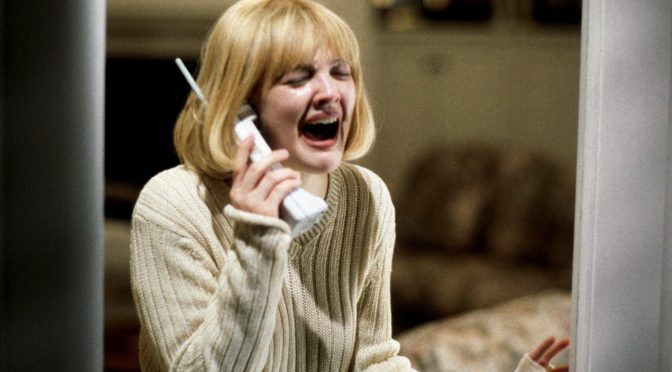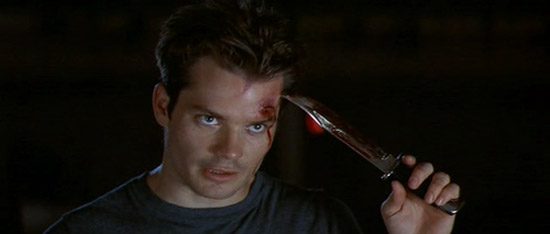“Please don’t kill me, Mr. Ghostface, I wanna be in the sequel!”
What a breath of fresh air Scream was. The film is a watershed moment in horror history, the point at which the genre became self-reflective. It’s brazenly meta in its commentary on horror tropes and plot points, and it came at the exact moment it was needed, when horror had been beaten to death and long since devolved into self-parody. Wes Craven was therefore the perfect choice to direct Scream, not only because he helped pioneer a lot of what Scream lampooned, but because he’s a gifted horror filmmaker, and Scream is not just a parody, but a classic horror film in its own right.
You only need to look as far as the opening scene to see Craven’s mastery. Structured like an urban legend (“the call is coming from inside the house” for a generation of cell phone owners), we see Casey Becker (Drew Barrymore) answer the phone and become subjected to increasingly tense psychological torture. She and the killer talk Halloween, Friday the 13th, and A Nightmare on Elm Street, and its alternately funny, strangely cute, and nerve-wracking. (This film did for ringing phones what Jaws did for the ocean and Psycho did for showers; purchase of caller ID tripled after Scream‘s release.)
Casey’s death is hugely important, not just for the film, but for horror film in general. That might sound overly grandiose, but her brutal demise shows that anyone in Scream is fair game (of course, this would be taken to the extreme, resulting in horror movies where everyone dies). Barrymore was initially offered the lead role of Sidney Prescott (played by Neve Campbell), but lobbied for the role of Casey for this exact reason.
Scream remains effectively gory, and its body count is impressively high by even modern standards. It’s an avowedly unsentimental film, which is good because the performances are uneven enough that you never get too attached to anyone. Campbell is solid, if unremarkable; elsewhere, Skeet Ulrich (playing Sidney’s boyfriend Billy Loomis) is trying way too hard to be Johnny Depp, down to the way he leans in doorframes. Matthew Lillard, a consistenly underrated performer, really embraces the awfulness of his character Stu, but he goes way over the top in the end. Courteney Cox has a ton of fun playing opportunistic reporter Gale Weathers, and David Arquette is mostly fine as Deputy Dewey, even if he keeps his mouth perpetually open and his eyes constantly squinted as part of his aw-shucks affectation.
The reason that Scream succeeds, and endures, is because it basically rebooted the entire genre. This movie is really goddamn hip, and so are its characters, all of them hyper-literate in film like they just left a Tarantino set. This enables the franchise’s most justifiably famous scene, and its greatest contribution to the cultural lexicon, wherein Jamie Kennedy’s Randy lays out the rules one has to follow in order to survive a horror film. It’s smart, and it’s funny, just like the film itself (even though some of the inside jokes are incredibly lame, like a character name-dropping a horror director named “Wes Carpenter,” or Craven showing up in a cameo as a janitor dressed in Freddy Kreuger’s actual outfit). The film’s cleverest joke is when Sidney mocks horror-movie heroines for always running upstairs when they should run outside; when the killer appears in her house, she heads upstairs immediately. The killer is constantly bumbling around; his style, such as it is, is frantic and inelegant, which makes for nice comedy as well as a rejection of the superhuman Michael Myers-style boogeyman.
Scream isn’t perfect, but it’s the shot in the arm that the genre needed. It showed that horror films didn’t need to have titles with numerals in them, that horror was cool, relevant, and ripe for both parody and reinvention. Subsequent sequels would take a dip in quality, but the original has remarkable staying power.
Scream 2 is a lot of fun, and as far as horror sequels go it’s one of the better ones, but let’s be honest, this movie is a goddamn mess sometimes. More often than not it buckles under the weight of its inflated cast, which includes new characters Mickey (Timothy Olyphant), Derek (Jerry O’Connell, playing a college student while he looks approximately a million), Hallie (Elise Neal, who never once registers, and whose character name I had to look up on IMDb), and Cotton Weary (Liev Schreiber, damn good). With all the new faces, Scream 2 also has to make time for Sidney, Randy, Gale, and Dewey, and it’s only occasionally up to the task.
Which is a shame, because this movie is as clever as its predecessor, even if it’s way more obvious. As the sequel to one of the goriest horror films ever made, Scream 2 has some thoughtful questions to ask about the effect that cinematic violence has on viewers. The film asks this question from the first scene, when Maureen (Jada Pinkett Smith) and Phil (Omar Epps) are killed at a showing of the film Stab, based on Gale Weathers’ book about the Woodsboro murders, creatively titled The Woodsboro Murders. When a screaming Maureen finally expires on stage in front of the screen, it’s a nicely unsettling image; it looks almost sacrificial. But the scene is tainted by some frankly racist characterization of Maureen, which would have raised hackles even in 1997. She has a knee-jerk hatred of white people, and she even shouts at the screen, a particularly dated stereotype.
Kevin Williamson (who also wrote Scream) does a better job with other characters, though, but I think that’s mainly due to the competence of the cast. The performances are better across the board – Jamie Kennedy is more tolerable, Neve Campbell morphs into a convincing badass, David Arquette is more self-assured and introspective, and Courteney Cox is impressively unafraid to make Gale Weathers unlikable. Cox and Arquette have some of the franchise’s strongest chemistry, and Scream 2 is smart to make them a couple.
It’s through Liev Schreiber’s Cotton Weary that the film really tries to expand the Scream universe (Scream-iverse?). Casting Schreiber was a smart move, because he’s so naturally menacing you just assume that he’s one of the killers. Cotton might not be a decent person – he has a myopic, fanatical obsession with getting on TV – but he is innocent at the very least.
There are some real problems with motivation and characterization, though. Sidney never once struck me as someone who craved attention or the spotlight; in fact she actively shunned it, which is why I call bullshit on her taking the lead role in a play (moreover, if you’re casting her in something, maybe it shouldn’t be as a woman being chased by men in masks wielding knives). The motivation of the killers – who are Mickey and Billy Loomis’s mom, by the way – boil down to a mix of the believable (revenge for her), and the misguided (for him it seems to be just for kicks). And unfortunately, in the big reveal scene, Olyphant’s restrained performance goes off the goddamn rails, because I just don’t think Wes Craven is that great at directing actors.
Scream is flawed, as a series, but it’s smarter than most horror films, and a whole lot more fun. The cast is generally pretty great, but beyond that, it’s really refreshing to see a film series so self-aware. The horror genre deserves a franchise like Scream.
10/1: Dawn of the Dead (2004)
10/2: The Exorcist
10/3: Pontypool
10/4: Hocus Pocus
10/5: The Orphanage
10/6: Rosemary’s Baby
10/7: Alien
10/8: Scream series
10/9: Scream series
10/10: Cujo
10/11: The Cabin in the Woods
10/12: Pulse
10/13: The Babadook
10/14: Friday the 13th
10/15: The Last House on the Left (both versions)
10/16: The Thing (both versions)
10/17: Little Shop of Horrors
10/18: Hush
10/19: Silent Hill
10/20: The Shining
10/21: Funny Games (2007)
10/22: Evil Dead series
10/23: Evil Dead series
10/24: The Mist
10/25: The Ninth Gate
10/26: The F






